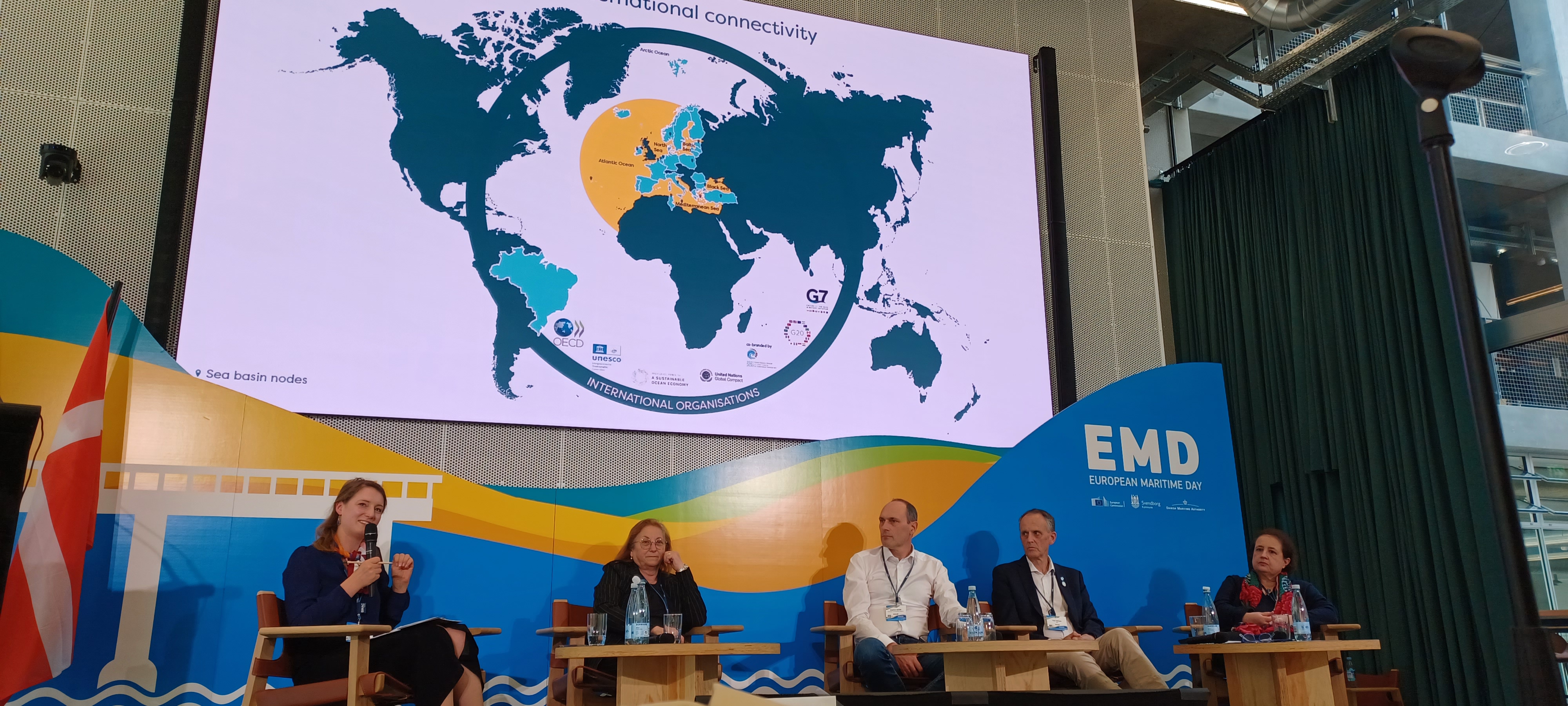- Home
- European Maritime Day: Towards Global Strategic Alignment For The European Blue Economy
European Maritime Day: Towards global strategic alignment for the European blue economy
The Sustainable Blue Economy Partnership contributed vividly to the European Maritime Day 2024. We convened a workshop on global strategic alignment of the blue economy and contributed to two further workshops on maximizing synergies and on planning and implementing equality in the blue economy, respectively. Read the full report on our website.
A global perspective
To achieve a sustainable blue economy across European sea basins within a global ocean, we need to think globally and act locally. With this in mind, the Partnership promoted global strategic alignment at the European Maritime Day 2024 in Svendborg, Denmark on 30-31 May.
The workshop ‘Towards Global Strategic Alignment for the EU Blue Economy’ engaged European and international high-level experts who highlighted global priorities and made connections to a sustainable blue economy across European sea basins. The experts represented key elements shaping the global ocean agenda, such as the UN Ocean Conference 2025, the UN Decade of Ocean Science for Sustainable Development, the High-Level Panel for a Sustainable Ocean Economy, the G7 Future of the Seas and Oceans Initiative, and the European Environment Agency.

Think globally: shared priorities at global level
The G7 Future of the Seas and Oceans Initiative (G7 FSOI) supports global coordinated action on ocean observation. As the National Contact Point of Italy, which chairs the G7 in 2024, Rosalia Santoleri (National Research Council of Italy, Institute of Marine Science) presented strategic priorities. Besides an Arctic Ocean Observing alliance building on the 2024 Arctic Science Summit Week, and Ocean Carbon, through an integrated ocean carbon observing system, the G7 FSOI topic of “Marine Research Infrastructure Integration and Harmonization” corresponds to the Partnership’s planned activity on sharing research infrastructures. The G7 FSOI also promotes integrated approaches for ocean governance, engages with the G20, and is relevant the Sustainable Blue Economy Partnership’s efforts to strengthen connections between Europe and Africa.
The third UN Ocean Conference (UNOC 3) will take place in Nice in June 2025 under the global framework of the UN Agenda 2030 for Sustainable Development. It will be co-hosted by France and Costa Rica. Isabelle Perret (French Directorate-General for Maritime Affairs, Fisheries and Aquaculture) shared some highlights expected in association with the event. The UNOC 3 shall adopt a “Nice Ocean Action Plan,” with ten actions to achieve the Sustainable Development Goal 14 - “Life below water”. The UNOC 3 will be preceded by the action-oriented Blue Economy Finance Forum in Monaco to mobilise private funding, and by the One Ocean Science Congress in Nice, in which the Partnership is actively involved. The UNOC 3 aims to showcase the implementation of the Agreement on Biodiversity Beyond National Jurisdiction under the UN Convention on the Law of the Sea. While the French Parliament has recently ratified this “High Seas Treaty”, strong mobilization worldwide is required to reach the necessary sixty ratifications.
Peter Haugan (Institute of Marine Research, Norway) co-chaired the UN Ocean Decade Working Group on the Challenge 4 “Sustainable and equitable ocean economy” under the global Vision 2030 Process. At the workshop, he referred to the Working Group’s white paper on progressing towards “The Ocean We Want”: It reframes the narrative on the role of businesses towards sustainability from business-as-usual to real game-changers and expands the paradigm of a “sustainable ocean economy” to a “sustainable and equitable ocean economy”, acknowledging that we need an inclusive approach that fosters equity and integrates the needs of local communities and indigenous knowledge.
As lead expert of the High Level Panel for a Sustainable Ocean Economy, which brings together the heads of State or Government of 18 countries around the world, Peter Haugan highlighted their commitment to sustainably manage 100% of their ocean area under national jurisdiction by 2025, guided by Sustainable Ocean Plans. Sustainable Ocean Planning offers a unifying framework for key concepts including Maritime Spatial Planning, integrated coastal zone management, marine protected areas and ecosystem-based management. The UN Ocean Decade has launched an Ocean Decade Programme on Sustainable Ocean Planning, which the Partnership is supporting to enhance existing efforts.
A tenor heard throughout the discussion was the need to strengthen the resilience of coastal communities. The UN Ocean Decade enhances indigenous and local communities towards a sustainable and equitable ocean economy, and resilience in coastal regions will be on the agendas of both the G7 next month in Bologna and the UNOC 3 in Nice next year. This suitably aligns with the pan-European priorities of the Partnership building upon its sea basins’ needs and strategies for the benefit of their local communities.
Act locally: co-design across European sea basins in a global ocean
How do we co-design a sustainable blue economy across European sea basins within a global ocean? Stéphane Isoard from the European Environment Agency connected the global to the local. By delivering expertise and sharing data towards decision-makers, the European Environment Agency supports Member States in implementing European policy goals. These include the Marine Strategy Framework Directive for the protection of the marine environment under national jurisdiction. Stéphane Isoard emphasised that trade-offs are necessary in a blue green transformation to a sustainable and competitive blue economy. He highlighted potential for minimising environmental impact through innovative offshore renewable energy solutions, including decommissioning, and through green shipping.
Implement existing rather than introducing new regulation
From the global to the local, speakers emphasised the need to implement existing regulations to achieve the blue green transformation, rather than introducing more regulations. The transformation must be underpinned by robust data, which only sustained ocean observing systems can provide. Regional sea basins were generally considered a good scale for “acting locally”. However, panellists noted that we also need transboundary cooperation and national coordination to increase efficiency at the institutional scale and support for coastal communities to strengthen resilience at the human scale.

